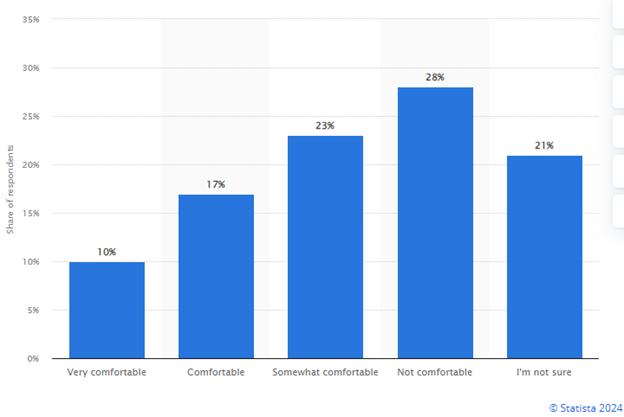Google handles approximately 8.5 billion searches daily, while ChatGPT processes about 10 million. This means, a large number of people still use Google for searches. But you can’t ignore the fact that AI-generated content is growing rapidly, increasing the chances of diverting immense traffic from Google.
However, Googling is a deeply ingrained habit, and changing such habits is not easy at all.
People will not stop Googling queries for many reasons. So, you should not stop creating content for these people, provided it is of high quality now.
Due to rising AI-generated content, competition for ranking the content has intensified. It is high time you adapt to changes in your strategies by considering the latest SEO trends or falling behind. Being an SEO content writer, you should be ready to embrace changes and follow consistency.
“SEO is a journey, not a destination.” – Danny Sullivan.
We have researched and found effective SEO trends to follow in 2024 to make your journey easier and help you achieve top rankings on Google SERPs.
How to Rank Your Content Amid AI Flood?: Latest SEO Trends for 2024
Are you trying to rank your content in 2024? Nowadays, many companies have started using AI-generated content, leading to competition among SEO content writers to rank on Google search results. Around 58% of companies use AI to create content today.
You can still rank your content and increase traffic on your website. Follow the below-mentioned ways.
Generate High-quality Content:
If you want to rank on Google SERPs, focus on creating high-quality content. It is not about using difficult vocabulary and difficult sentences; it is about delivering value to readers by presenting them what they need. You can also use AI-generated content as well if it resonates with the needs of your audience.
If you are wondering, “Is AI-written content good for SEO?” The answer is Yes. But merely copying and pasting is Not. Copied content can’t rank. You have to improve the quality of the content by crafting it for the targeted audience with the right keywords. Include information that has not been used by your competitors yet.
If you want to continually grow your blog, you need to learn to blog on a consistent basis”.-Neil Patel
Improve User Experience:
It is one of the crucial SEO trends that covers all the crucial points. Google shows Search Generative Experience (SGE) results to improve its user experience because users are everything. So, you should create content keeping users’ or readers’ search intent and interests in mind.
If you are thinking, “Is AI writing better than human writing?”, the answer is No. Because content written by a robot sounds lifeless and boring. You can enhance the user experience by editing it to your specifications. Now, Google will focus more on the CTR of the content to rank it. So, drive your entire focus to providing the best to users.
“The best SEO strategy is to focus on the user.” – Marcus Tober
Leverage AI Tools to the Fullest:
Are you in doubt about using AI for content creation? You can use AI as a content writer; otherwise, you will be wasting most of your time researching through traditional ways. Many writers ask, “Is it unethical to use AI for writing?”. It is not unethical as long as you deliver productivity and results. There is nothing about ethics because AI tools are created to be used.
With AI, you can quickly create a click-worthy title and grab your readers’ attention. AI plays a crucial role in everything from idea generation to crafting blog outlines and improving sentence structure. Where you used to take hours to create compelling content, with AI, it can be done in a few minutes. Provided, you humanize the content and edit it according to the audience.
Without human oversight, content can perform poorly. AI-generated content has recorded poor performance in video-streaming services in the USA. Have a look at the image below.
Follow EEAT Guidelines:
If you want to rank on Google search results, you can’t ignore EEAT guidelines. It is a framework suggested by Google to content creators. It stands for Experience, Expertise, Authoritativeness, and Trustworthiness. Follow this framework when creating content for any website, as Google also assesses content based on EEAT.
Experience: How much experience do you have on the topic you are writing about?
Expertise: Do you have relevant expertise (Subject matter expert)
Authoritativeness: Is your site or you as a writer known for this field?
Trustworthiness: Is your content accurate and properly sourced?
Always stay up to date with Google updates to rank before your competitors. Subscribe to the sources that offer first-hand information and research.
Focus on the Author’s Entity:
AI doesn’t take responsibility for the content it provides; it can be right or wrong. But when a person writes something, they are accountable for every word they write. By clearly displaying your name and identity with the content, you can establish credibility. It is the best way to attract more readers with less effort.
Since readers know the internet is overloaded with AI-generated content, they look for content written by a human with a proper identity. If you follow this step, there is a high chance your content will rank.
Use Long-tail Keywords:
Now, people search with exact questions, so Google has to optimize results with long-tail keywords. You should also focus on long-tail keywords and exact user queries while writing a blog. After the advent of ChatGPT, people have started to search with specific queries rather than generic terms.
Around 70% of all Google searches use long-tail keywords. These types of searches offer higher conversion rates. So, when you write content, include long-tail keywords. They are mostly questions. The more questions you cover in your content, the higher your chances of ranking.
Match Search Intent:
Almost all types of search intent fall into four categories: Informational, transactional, navigational, and commercial. Before you start crafting your content, be clear about the search intent of your audience. It will help you create specific content that readers will definitely read as you have addressed their pain points. Try to match with the main purpose of potential readers.
Let’s understand the difference between all four search intents.
Informational: What are the best features of noise-cancelling headphones?
Transactional: Where can I buy the best noise-cancelling headphones?
Commercial: Which brands offer the best noise-canceling headphones?
Navigational: Best headphones by Bose company
Try to include exact questions in the title and make it catchy. It will increase the chances of clicks on the title. A click-worthy title is more likely to get more clicks than other titles, even if they cover keywords.
“A click-worthy title is actually worth a lot more than just a perfectly keyword-targeted title”– Rand Fishkin.
Include More Questions:
Add more related questions to your blog to cover various aspects of the topic. Google values content that thoroughly covers the subject. This way, readers will find answers to all the related queries. People like to spend time on content that provides all the answers, eliminating the need to search for more. It signals to Google that more people are finding the particular content useful; therefore, the bot automatically ranks it at the top.
You can include several relevant questions in your blog in a short time using AI tools like ChatGPT, Gemini, and others.
Does Google detect AI writing? Yes. So, you must change the sentence structure, keeping the real meaning intact. If your content is crafted with the user experience in mind, Google can’t penalize it for AI-written content.
Optimize for Voice and Visual Search:
Did you know that after the introduction of SGE, the percentage of zero-click searches on the Google search engine increased? So, now, how can SEO ranking improve in 2024? Its time to Focus on voice and visual search along with written content.
Research and find out how people search with voice and visuals. The average length of voice search people use is 29 words. Moreover, 90% of people believe they can search effectively through voice search without making mistakes because it’s easy. They also find it fast and feasible.
So, include queries people use when they search through voice. This will make your content more valuable and comprehensive. The Google bot can also understand the content is performing well. Additionally, include images in the content to make it engaging. You can use image metadata and reverse image retrieval methods to optimize content for visual search.
Include Viral and Real World Examples:
More than 59% of people are active on social media. When anything goes viral on social media, it fits into people’s minds. If you use viral content and videos in your blog, it increases content relevance, and readers find it more appealing and engaging. The content sounds fresh, humanized, and exciting, attracting more readers.
As a result, Google ranks this content at the top of SERPs after analyzing its performance and user experience. Besides that, take the help of real-world examples to make your content lively. These examples make the content engaging, readable, and enjoyable.
Focus on Technical SEO:
This point is for SEO professionals. However, writers should also read it. Technical SEO ensures the search engine crawls and indexes the blog or website properly. Everything can go in vain if crawlers can not index your content.
Optimize the site’s speed, mobile-friendliness, and proper URL structures. Check broken links and site architecture, and optimize metadata. When a blog or website is not optimized for technical SEO, Google crawlers can’t index it.
So, along with all the above-mentioned SEO trends, follow this one as well. It would say, before you begin writing, check the technical SEO of the site first.
Leave no stone unturned if you want to rank your content.
“No website can stand without a strong backbone. And that backbone is technical SEO.”-Neil Patel.
How to Use AI for SEO? Best Practices
You can use AI for SEO in various ways to improve productivity. Here are the best ways to follow to rank your website and blogs.
Keyword Research:
Keyword research plays a crucial role in crafting SEO-friendly content. You can get a list of keywords for your blog topic by writing a prompt using an AI tool. Moreover, many tools don’t require you to write a prompt; they provide a list of keywords analyzing the blog’s topic.
Technical SEO:
You can utilize AI to optimize your website for technical SEO. It helps to find broken links, correct site speed, and optimize the site for mobile users.
Content Creation:
AI tools offer various features for creating compelling blog posts. From idea generation to proofreading, AI tools work wonders for effective content creation. Moreover, you can improve sentences to make them more relevant to the target audience.
User Experience:
AI can analyze user behavior and interactions and generate reports of everything. Considering the insights provided by AI, you can improve your site designs and overall look and feel. This often leads to better engagement and lower bounce rates.
Will SEO be Relevant in 2025?
Many content creators have this question in their minds. In 2025, writers will have to concentrate their focus more on intent-based content. Due to tools like ChatGPT, people can stop using Google for informational content. So, SEO will be used more for the other three types of search intents: promotional, transactional, and commercial.
So, SEO will be relevant in 2025. However, you will have to improve and change the way you create content by analyzing users’ search intents.
Will SEO be relevant in 2025? What do you think?
Conclusion:
Achieving a high rank on Google SERPs is still possible if you follow the right approach. Focus on crafting high-quality content, keeping your target audience in mind. Follow EEAT guidelines and make your content specific by adding the exact search queries of people in your content.
Additionally, AI can be utilized to speed up and improve the process of content creation, proofreading, and research. Overall, follow all the latest SEO trends discussed in the blog to secure top rank in SERPs and improve visibility among your audience. You may find following all points at once difficult, but you can start seeing results in your 2nd or 3rd blog.
Frequently Asked Questions
- What is the future of SEO in 2030?
AI will become an integral part of SEO, and most research and keyword analysis processes will be automated. People will use search engines primarily for three types of intent: commercial, transactional, and navigational. So, you will have to become the go-to source for your information. - Can I rank my content in 2024?
Yes, you can rank your content. However, now more than ever, you must focus on quality, long-tail keywords, target audience, search intent, humanized content, and Google framework guidelines. - Is SEO still in demand?
Yes, SEO is in demand and will continue to be so as long as new businesses emerge. SEO helps drive traffic and improves brand awareness. - Is SEO dead after AI?
No, AI is here to help SEO professionals and enhance quality standards. So, we don’t think SEO can be dead after AI because businesses need to improve their visibility. - Will AI replace content writers?
If you stop writing because of the fear of AI, then only it can replace you. Imagine the world in 2030, where people no longer trust AI-written content and only want to read content from individual authors. So, first, people will move to AI content, and then they will come back to old way as it offers more authenticity. - Is it ok to use AI for copywriting?
Yes, it is ok, provided you know how to use AI for copywriting. Don’t copy-paste the stuff; use your experience, research skills, and creativity while writing. - How to humanize AI content?
AI-written content is often full of difficult words, decreasing the legibility of the content. Edit AI content in a way that makes your friend understand a topic over a call. Replace difficult terminologies with easy ones. Include real-life examples with the latest information.











